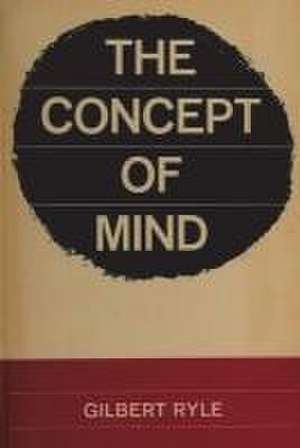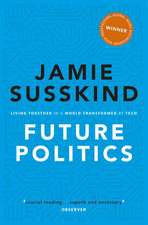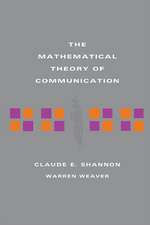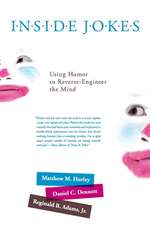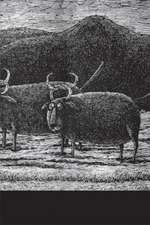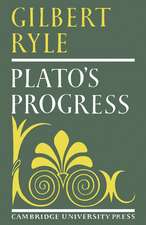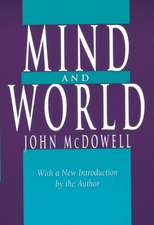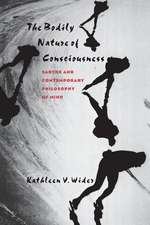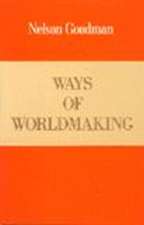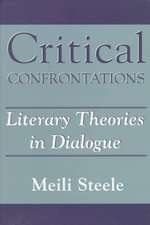The Concept of Mind
Autor Gilbert Ryleen Limba Engleză Paperback – 11 mai 2023
| Toate formatele și edițiile | Preț | Express |
|---|---|---|
| Paperback (3) | 82.03 lei 3-5 săpt. | +9.79 lei 7-13 zile |
| Penguin Books – 2 aug 2000 | 82.03 lei 3-5 săpt. | +9.79 lei 7-13 zile |
| University of Chicago Press – 15 dec 2000 | 181.27 lei 3-5 săpt. | |
| Must Have Books – 11 mai 2023 | 96.25 lei 6-8 săpt. | |
| Hardback (1) | 406.25 lei 3-5 săpt. | +38.69 lei 7-13 zile |
| Taylor & Francis – 5 iun 2009 | 406.25 lei 3-5 săpt. | +38.69 lei 7-13 zile |
Preț: 96.25 lei
Nou
Puncte Express: 144
Preț estimativ în valută:
18.42€ • 19.16$ • 15.41£
18.42€ • 19.16$ • 15.41£
Carte tipărită la comandă
Livrare economică 15-29 martie
Preluare comenzi: 021 569.72.76
Specificații
ISBN-13: 9781774645215
ISBN-10: 1774645211
Pagini: 318
Dimensiuni: 154 x 223 x 22 mm
Greutate: 0.47 kg
Editura: Must Have Books
ISBN-10: 1774645211
Pagini: 318
Dimensiuni: 154 x 223 x 22 mm
Greutate: 0.47 kg
Editura: Must Have Books
Notă biografică
Gilbert
Ryle
was
Waynflete
Professor
of
Metaphysical
Philosophy
at
the
University
of
Oxford
between
1945
and
1968
and
editor
of
'Mind'
from
1947
to
1971.
He
died
in
1976.
Eminent philosopher and cognitive scientist Daniel C. Dennett is the authorof Darwin's Dangerous Idea.
Eminent philosopher and cognitive scientist Daniel C. Dennett is the authorof Darwin's Dangerous Idea.
Descriere
Descriere de la o altă ediție sau format:
Lets us re-examine many cherished ideas about knowledge, imagination, consciousness and the intellect. This book features a classic example of philosophy.
Lets us re-examine many cherished ideas about knowledge, imagination, consciousness and the intellect. This book features a classic example of philosophy.
Cuprins
Introduction
I. Descartes' Myth
1. The Official Doctrine
2. The Absurdity of the Official Doctrine
3. The Origin of the Category Mistake
4. Historical Note
II. Knowing How and Knowing That
1. Foreword
2. Intelligence and Intellect
3. Knowing How and Knowing That
4. The Motives of the Intellectualist Legend
5. 'In My Head'
6. The Positive Account of Knowing How
7. Intelligent Capacities versus Habits
8. The Exercise of Intelligence
9. Understanding and Misunderstanding
10. Solipsism
III. The Will
1. Foreword
2. The Myth of Volitions
3. The Distinction Between Voluntary and Involuntary
4. Freedom of the Will
5. The Bogy of Mechanism
IV. Emotion
1. Foreword
2. Feelings versus Inclinations
3. Inclinations versus Agitations
4. Moods
5. Agitations and Feelings
6. Enjoying and Wanting
7. The Criteria of Motives
8. The Reasons and Causes of Actions
9. Conclusion
V. Dispositions and Occurrences
1. Foreword
2. The Logic of Dispositional Statements
3. Mental Capacities and Tendencies
4. Mental Occurrences
5. Achievements
VI. Self-Knowledge
1. Foreword
2. Consciousness
3. Introspection
4. Self-Knowledge Without Privileged Access
5. Disclosure by Unstudied Talk
6. The Self
7. The Systematic Elusiveness of 'I'
VII. Sensation and Observation
1. Foreword
2. Sensations
3. The Sense Datum Theory
4. Sensation and Observation
5. Phenomenalism
6. Afterthoughts
VIII. Imagination
1. Foreword
2. Picturing and Seeing
3. The Theory of Special Status Pictures
4. Imagining
5. Pretending
6. Pretending, Fancying and Imagining
7. Memory
IX. The Intellect
1. Foreword
2. The Demarcation of the Intellect
3. The Construction, Possession and Utilisation of Theories
4. The Application and Misapplication of Epistemological Terms
5. Saying and Teaching
6. the Primacy of the Intellect
7. Epistemology
X. Psychology
1. The Programme of Psychology
2. Behaviourism
Index
I. Descartes' Myth
1. The Official Doctrine
2. The Absurdity of the Official Doctrine
3. The Origin of the Category Mistake
4. Historical Note
II. Knowing How and Knowing That
1. Foreword
2. Intelligence and Intellect
3. Knowing How and Knowing That
4. The Motives of the Intellectualist Legend
5. 'In My Head'
6. The Positive Account of Knowing How
7. Intelligent Capacities versus Habits
8. The Exercise of Intelligence
9. Understanding and Misunderstanding
10. Solipsism
III. The Will
1. Foreword
2. The Myth of Volitions
3. The Distinction Between Voluntary and Involuntary
4. Freedom of the Will
5. The Bogy of Mechanism
IV. Emotion
1. Foreword
2. Feelings versus Inclinations
3. Inclinations versus Agitations
4. Moods
5. Agitations and Feelings
6. Enjoying and Wanting
7. The Criteria of Motives
8. The Reasons and Causes of Actions
9. Conclusion
V. Dispositions and Occurrences
1. Foreword
2. The Logic of Dispositional Statements
3. Mental Capacities and Tendencies
4. Mental Occurrences
5. Achievements
VI. Self-Knowledge
1. Foreword
2. Consciousness
3. Introspection
4. Self-Knowledge Without Privileged Access
5. Disclosure by Unstudied Talk
6. The Self
7. The Systematic Elusiveness of 'I'
VII. Sensation and Observation
1. Foreword
2. Sensations
3. The Sense Datum Theory
4. Sensation and Observation
5. Phenomenalism
6. Afterthoughts
VIII. Imagination
1. Foreword
2. Picturing and Seeing
3. The Theory of Special Status Pictures
4. Imagining
5. Pretending
6. Pretending, Fancying and Imagining
7. Memory
IX. The Intellect
1. Foreword
2. The Demarcation of the Intellect
3. The Construction, Possession and Utilisation of Theories
4. The Application and Misapplication of Epistemological Terms
5. Saying and Teaching
6. the Primacy of the Intellect
7. Epistemology
X. Psychology
1. The Programme of Psychology
2. Behaviourism
Index
Recenzii
'This new edition of Ryle’s classic work, with a substantial critical study by Julia Tanney, will make possible a re-assessment of Ryle and of the revolutionary potential of The Concept of Mind. Tanney’s treatment of Ryle is complex and subtle, and opens up important new ways of thinking in philosophy of mind and philosophy of language.' - Cora Diamond, University of Virginia, USA
